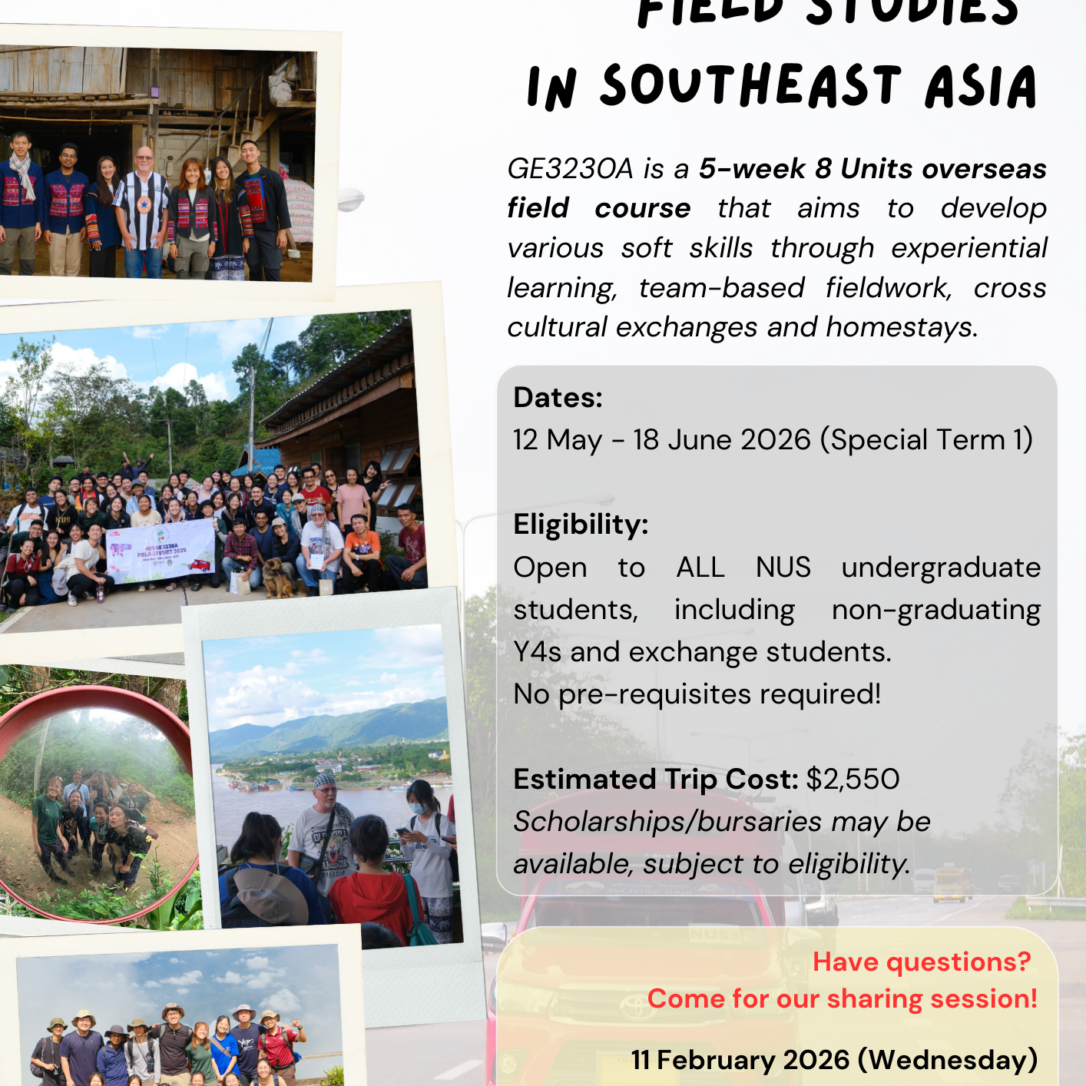Where Will You Make Your Impact?
Understand The World. Shape Your Future.
From climate resilience to global justice, NUS Geographers learn from today’s problems to design tomorrow’s solutions. Through an interdisciplinary curriculum that integrates physical and human geography, students examine real-world challenges across local, regional, and global contexts. Grounded in research and practice, NUS Geography equips learners with the critical and applied skills needed to shape more equitable and resilient futures.

Climate Change
How do we respond to a warming world?
Analyse climate impacts and adaptation strategies to drive solutions in policy, planning, and environmental consultancy.

Sustainable Development
How can we live well on a damaged planet?
Evaluate and design pathways for balancing growth, equity, and environment to shape sustainable futures across public and private sectors.

Globalisation & Inequality
Is there hope for the future?
Examine how global flows of power, trade, and culture create uneven geographies, opening pathways into public policy, urban and corporate consultancy.

Our Everyday Worlds
How do we create meaningful worlds for ourselves and others?
Explore how identities, practices, and cultures shape everyday spaces and places, building skills for careers in planning, community engagement, marketing and project management.

Geospatial Intelligence
Want to see the world in 4D?
Apply spatial analysis, mapping, and data visualisation to solve real-world challenges in industry, government, and academia.

The Geographical Sciences
Want to shape the world, literally?
Study Earth’s dynamic systems to build skills in analysis and field research, leading to careers in environmental consultancy, resource management and conservation, and sustainability planning.
Explore Our Programmes
News & Happenings
NUS Geography Now
When seniors live alone, it doesn’t mean they are lonely: Professor Elaine Ho and Associate Professor Feng Chen-Chieh, together with Associate Professor Vincent Chua (Department of Sociology & Anthropology), challenge the idea that solo living equates to social isolation.
This is an extension of an earlier op-ed, “Seniors are taking the kampung spirit beyond the neighbourhood”, where they highlight how older adults actively cultivate connection, care, and community in spatially dispersed ways.
Upcoming Events

Field Studies 2026 - Official Registrations Open!
GE3230A is a 5-week, 8-unit overseas field course conducted in Southeast Asia during Special Term 1 (12 May - 18 June 2026). Students interested in enrolling can officially register for the course via the link below.

Seminar
Radical Care-work, Critical Pedagogy and the Livable City: Revisiting the History of Urban Squatting in West Berlin, 1968-1977, by Professor Alex Vasudevan, School of Geography and the Environment University of Oxford on Monday 16 March 2026, 9.30am, Geography Seminar Room, AS2 #03-02.
More Than Race: A Comparative Analysis of “New” Indian and Chinese Migration in Singapore
The Comprehensive Economic Cooperation Agreement (CECA) was signed on 29 June 2005. It eased the flow of goods, services and investments between Singapore and India. As Indian immigrants flowed into Singapore, Singaporeans resisted the changing cultural dynamics and increase in job competition. Some even left spiteful social media comments to air their displeasure. Such incidences …
Associate Professor Elaine Ho featured in CNA’s ‘Innovating for the Future – S1E7: Ageing’
On 15 June 2022, Associate Professor Elaine Ho (NUS Geography and Asia Research Institute) was featured on Channel NewsAsia (CNA) in ‘Innovating for the Future – S1E7: Ageing’. In recent years, Singapore has seen a gradual shift towards ageing in place. Long-term care for the elderly is crucial but often ignored in this transition. A/P …
New 360imx Takes Immersive Learning to New Heights and Depths
NUS is the first academic institution in Singapore to install the 360imx – a fully immersive, collaborative space for visualising and engaging in a wide range of content.





